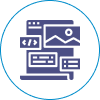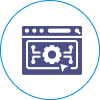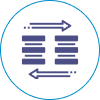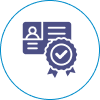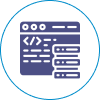Numerous important features and advantages of Medical software help to improve and streamline the operations of Medical companies. Here are a few noteworthy attributes and advantages:
Streamlined Patient Management
Patient information can be efficiently managed and organized with the help of medical software. Healthcare providers may quickly manage medical histories, access patient data, and expedite administrative duties with the use of robust features like electronic health records (EHR). This eventually improves the overall quality of patient care.
Improved Accuracy and Precision
The decreased likelihood of human error is one of the main advantages of medical software. The program reduces the possibility of errors in patient records and treatment plans by automating procedures and data entry. Consequently, this improves the accuracy of diagnoses and guarantees that medical personnel have access to trustworthy information.
Enhanced Communication and Collaboration
Within a healthcare facility, medical software enables smooth communication between medical experts. Immediate communication of test findings, treatment plans, and patient information is made possible, improving departmental teamwork. The instantaneous sharing of data results in better organized and efficient patient care.
Efficient Appointment Scheduling
Medical software offers a user-friendly interface for managing appointments, making it easier for patients and healthcare professionals to schedule appointments. Automated alerts and reminders lower the number of no-shows, maximize the use of available resources, and help create a more structured and effective medical practice.
Comprehensive Billing and Financial Management
One of the most important parts of managing finances in the healthcare industry is billing. Medical software tracks insurance claims, handles financial transactions, and automates billing procedures. This guarantees correct billing, lowers billing errors, and strengthens the financial stability of medical practices as a whole.
Compliance with Regulatory Standards
Medical software is made to abide by rules and guidelines related to healthcare. It supports healthcare providers in upholding industry standards, data security, and regulatory obligations. This keeps healthcare businesses out of legal hot water and guarantees the security of private patient data.
Data Analysis for Informed Decision-Making
Analytics tools are frequently included in medical software, allowing medical personnel to examine patient data, trends, and results. By supporting evidence-based decision-making, this data-driven method assists healthcare providers in making well-informed decisions regarding treatment regimens, resource allocation, and overall healthcare strategy.
Remote Access and Telehealth Integration
In the current era of growing digital connectivity, remote access to patient data is frequently made possible by medical software. Furthermore, a lot of platforms have telehealth functions, which let medical practitioners watch patients from a distance, conduct virtual consultations, and give prompt medical advice—all of which enhance accessibility and patient care.
Seamless Integration with Diagnostic Tools
Test results and diagnostic images can be directly transferred into patient records thanks to the frequent integration of medical software with different diagnostic tools and equipment. This integration guarantees that medical personnel have a thorough understanding of a patient's health status, improves the diagnostic process, and lowers the possibility of data entry errors.
Patient Engagement and Empowerment
Patient portals are a common feature of contemporary medical software platforms, enabling patients to actively engage in their healthcare experience. Access to medical data, appointment scheduling, and instructional materials are all available to patients, encouraging patient participation and a team-based approach to treatment.
Time and Resource Optimization
Medical software helps healthcare providers by automating repetitive administrative chores so they can devote more time to patient care. Increased productivity is a result of resource optimization, which also includes staff time and equipment consumption. This frees up healthcare personnel to concentrate on providing individualized and efficient medical care.
Scalability and Customization
Medical software programs are made to adapt to the various requirements of various healthcare environments. These platforms generally provide choices for customization and scalability, regardless of the size of the practice—small clinics, major hospitals, or specialty practices. Because of its flexibility, healthcare practitioners can customize the program to fit their unique needs and preferred workflows.








